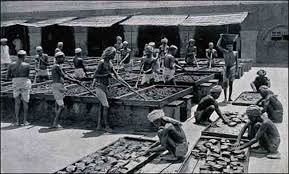Notes On History-Education System in India during British Rule-For WBCS Exam.
ইতিহাস সম্পর্কিত নোট – ব্রিটিশ শাসনের সময় ভারতে শিক্ষা ব্যবস্থা – WBCS পরীক্ষার জন্য।
Development of modern education
- The company wanted some educated Indians who could assist them in the administration of the land.Continue Reading Notes On History-Education System in India during British Rule-For WBCS Exam.
- Also, they wanted to understand the local customs and laws well.
- For this purpose, Warren Hastings established the Calcutta Madrassa in 1781 for the teaching of Muslim law.
- In 1791, a Sanskrit College was started in Varanasi by Jonathan Duncan for the study of Hindu philosophy and laws.
- The missionaries supported the spread of Western education in India primarily for their proselytising activities. They established many schools with education only being a means to an end which was Christianising and ‘civilising’ the natives.
- The Baptist missionary William Carey had come to India in 1793 and by 1800 there was a Baptist Mission in Serampore, Bengal, and also a number of primary schools there and in nearby areas.
- The Indian reformers believed that to keep up with times, a modern educational system was needed to spread rational thinking and scientific principles.
- The Charter Act of 1813 was the first step towards education being made an objective of the government.
- The act sanctioned a sum of Rs.1 lakh towards education of Indians in British ruled India. This act also gave an impetus to the missionaries who were given official permission to come to India.
- But there was a split in the government over what kind of education was to be offered to the Indians.
- The orientalists preferred Indians to be given traditional Indian education. Some others, however, wanted Indians to be educated in western style of education and be taught western subjects.
- There was also another difficulty regarding the language of instruction. Some wanted the use of Indian languages (called vernaculars) while others preferred English.
- Due to these issues, the sum of money allotted was not given until 1823 when the General Committee of Public Instruction decided to impart oriental education.
- In 1835, it was decided that western sciences and literature would be imparted to Indians through the medium of English by Lord William Bentinck’s government.
- Bentinck had appointed Thomas Babington Macaulay as the Chairman of the General Committee of Public Instruction.
- Macaulay was an ardent anglicist who had absolute contempt for Indian learning of any kind. He was supported by Reverend Alexander Duff, JR Colvin, etc.
- On the side of the orientalists were James Prinsep, Henry Thomas Colebrooke, etc.
- Macaulay minutes refer to his proposal of education for the Indians.
- According to him:
- English education should be imparted in place of traditional Indian learning because oriental culture was ‘defective’ and ‘unholy’.
- He believed in education a few upper and middle class students.
- In course of time, education would trickle down to the masses. This was called infiltration theory.
- He wished to create a class of Indians who were Indian in colour and blood but English in taste and affiliation.
- In 1835, the Elphinstone College (Bombay) and the Calcutta Medical College were established.
Wood’s Despatch (1854)
- Sir Charles Wood was the President of the Board of Control of the company in 1854 when he sent a despatch to the then Governor-General of India, Lord Dalhousie.
- This is called the ‘Magna Carta of English education in India.’
- Recommendations of the Wood’s Despatch:
- Regularise education system from the primary to the university levels.
- Indians were to be educated in English and their native language.
- Education system was to be set up in every province.
- Every district should have at least one government school.
- Affiliated private schools could be granted aids.
- Education of women should be emphasised.
- Universities of Madras, Calcutta and Bombay were set up by 1857.
- University of Punjab – 1882; University of Allahabad – 1887
- This despatch asked the government to take up the responsibility of education of the people.
Assessment of the British efforts on education
- Although there were a few Englishmen who wanted to spread education for its own sake, the government was chiefly concerned only with its own concerns.
- There was a huge demand for clerks and other administrative roles in the company’s functioning.
- It was cheaper to get Indians rather than Englishmen from England for these jobs. This was the prime motive.
- No doubt it spread western education among Indians, but the rate of literacy was abysmally low during British rule.
- The state of women education was pathetic. This was because the government did not want to displease the orthodox nature of Indians and also because women could not generally be employed as clerks.
- In 1911, illiteracy rate in British India was 94%. In 1921, it was 92%.
- Scientific and technical education was ignored by the British government.
Our own publications are available at our webstore (click here).
For Guidance of WBCS (Exe.) Etc. Preliminary , Main Exam and Interview, Study Mat, Mock Test, Guided by WBCS Gr A Officers , Online and Classroom, Call 9674493673, or mail us at – mailus@wbcsmadeeasy.in
Please subscribe here to get all future updates on this post/page/category/website



 Toll Free 1800 572 9282
Toll Free 1800 572 9282  mailus@wbcsmadeeasy.in
mailus@wbcsmadeeasy.in


















































































































